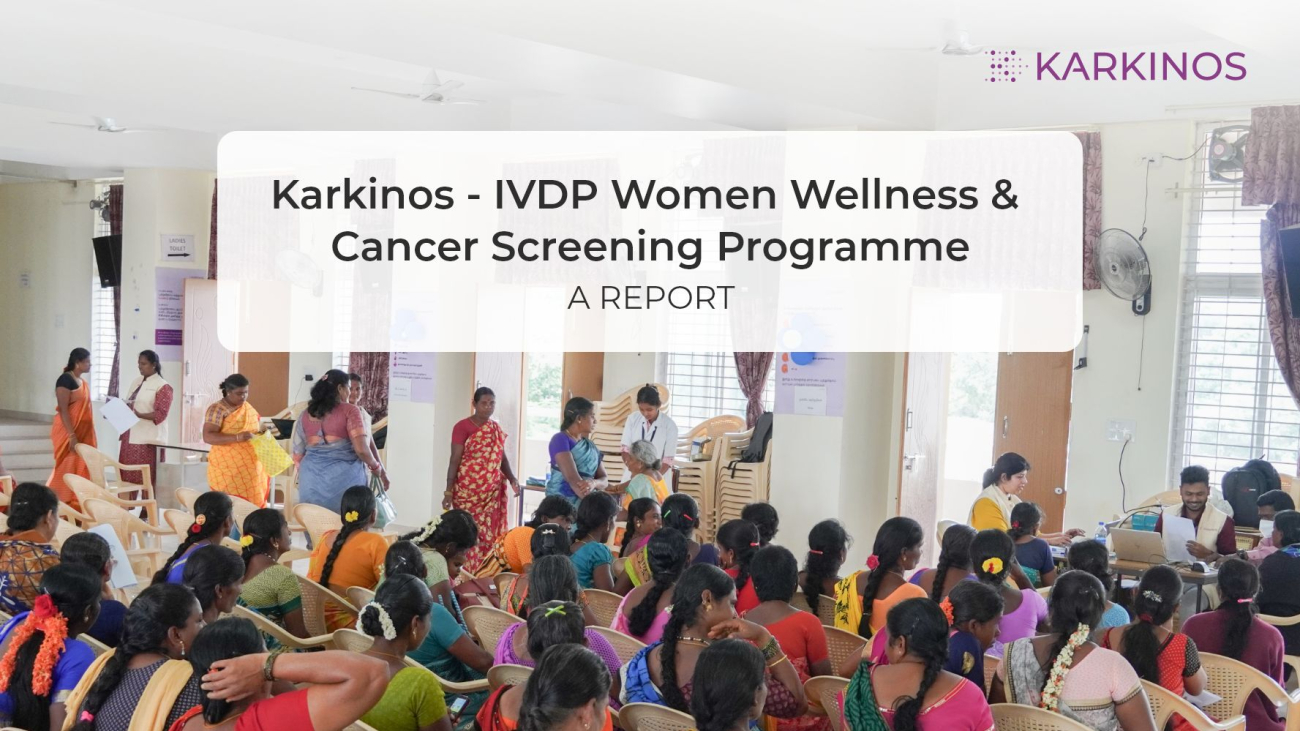Karkinos Healthcare-IVDP Collaborative Women’s Cancer Screening Initiative: A Comprehensive Report
In the beginning of 2022, around mid-November, Karkinos Healthcare (KH) rolled out the women’s cancer screening and early detection programme in association with the Integrated Village Development Project (IVDP) at Krishnagiri, Tamil Nadu.
IVDP is one of the most empowering non-governmental organisations (NGOs) in the country that has more than 16,000 self-help groups with approximately 3 lakh women as its members. IVDP is led by a visionary-leader-philanthropist, Mr. Kulandai Francis.
A Ramon Magsaysay awardee and the Founder-President of IVDP, Mr. Kulandai Francis has extended tremendous support for the betterment of communities in many districts of Tamil Nadu, and he is revered highly among the local people as a Good Samaritan. IVDP is also a micro-financing organisation and the membership covers four districts particularly Krishnagiri, Dharmapuri, Tirupathur, and Vellore.
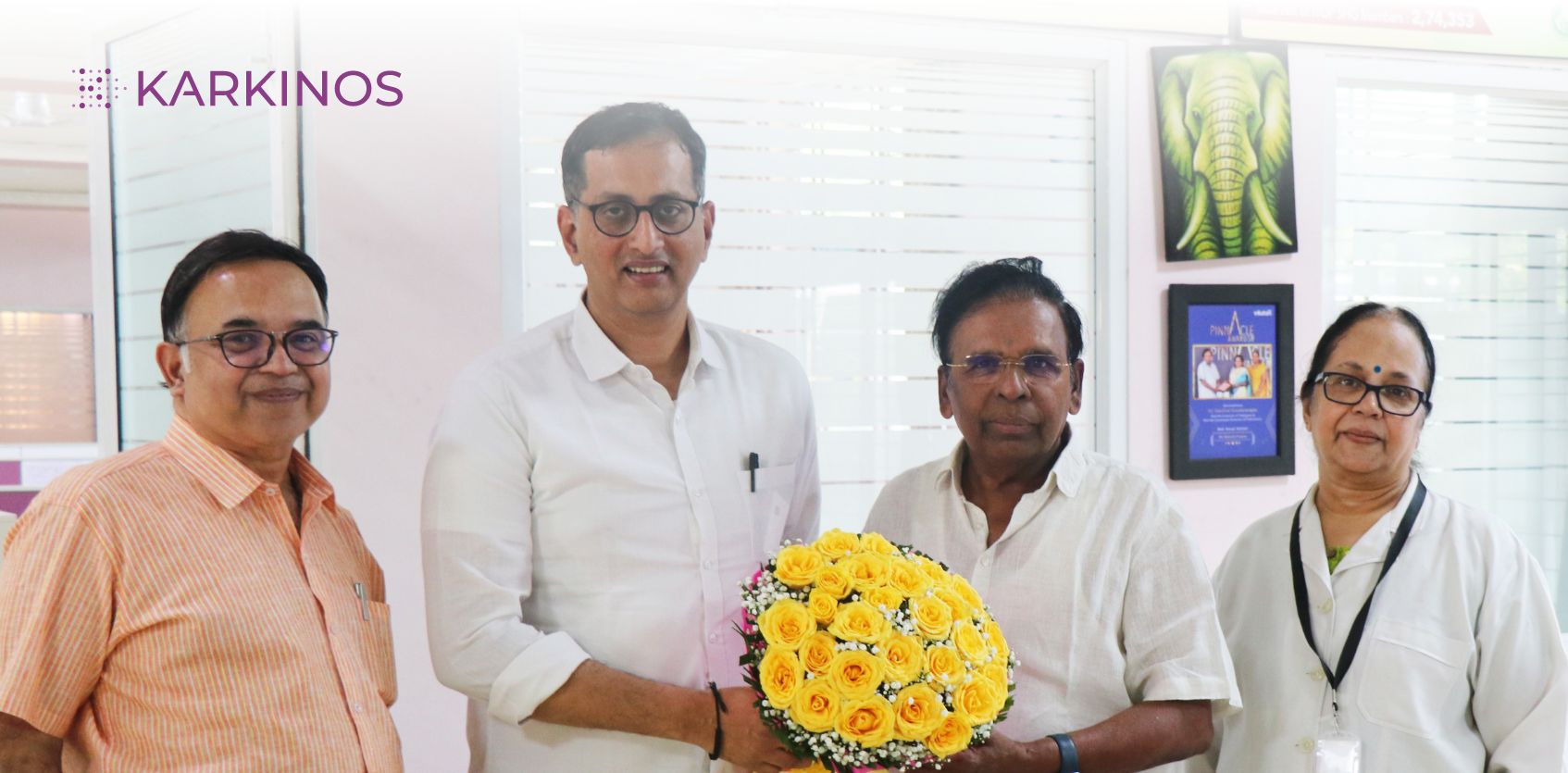
Mr. Francis’ active participation in the improvement of public health and his vision to build a cancer-free society motivated him to join hands with Karkinos Healthcare, which has a similar mission and vision to bring about large-scale awareness on cancer prevention and also take cancer care closer to people’s homes.
Hence, we at Karkinos Healthcare and IVDP (KH-IVDP) resolved to establish this as a model cancer screening programme that will benefit around 3 lakh women, who can avail our services to help them early detect cancer or identify their risk towards cancer development in their lifetime.
A detailed report on this KH-IVDP cancer screening programme has been brought out to showcase the workflow and the process of an effective cancer screening programme that can be standardised across regions. The report describes the workflow of the staff on ground, the methods adopted to screen for oral, breast, and cervical cancers among the rural women, and the technology-support at every citizen touch point to enable a seamless screening programme has been detailed.
The report includes the following stages of the cancer screening programme:
- Announcement of the programme dates to members of IVDP through self-help group leaders;
- Registration of women appearing for screening at KH-IVDP programme by IVDP staff;
- Counselling on cancer prevention;
- KH identity (KH-ID) generation and Ayushman Bharat Health Account (ABHA) generation by KH staff;
- Checking for vitals – height, weight, blood pressure, pulse rate, etc.;
- Screening:
a) Oral Visual Examination (OVE)
b) Clinical Breast Examination (CBE)
c) Cervical cancer screening through human papillomavirus (HPV) DNA testing - Final Verification and Post Counselling
Announcement of the programme dates to members of IVDP through self-help group leaders
The IVDP members are formed in different groups based on their location and then certain villages are combined to make it a cluster. They have 82 clusters and nearly 16000 groups. Each group has a leader and is held responsible in communicating the dates to the respective group members. Once the dates are announced the members are encouraged to report at the IVDP centre for participating in the awareness programme. A cancer awareness booklet in Tamil language, which has been prepared to educate the IVDP members on the importance of partaking in this programme, is circulated. The leaders in fact are more of a foot soldier who help propagate the cancer early detection programme. The leaders also ensure that all women in their group (approximately 3000-4000 women in each group ) participate in the programme
Registration of women appearing for screening for KH-IVDP programme by IVDP staff
On the day of the programme, which begins punctually at 9 am, members of IVDP report their attendance for this programme and register themselves at the IVDP registration desk. IVDP offers a subsidised rate for its members to avail the cancer screening tests. Payment for this screening is done by the members of IVDP themselves through a micro-financing model, which is then repaid to IVDP over a period of time in small instalments.
Registration helps IVDP members to follow-up on the positive cases, who are then referred to St. John’s Hospital, Bangalore for further investigation and treatment. Also, St. John’s doctors may visit Krishnagiri and perform advanced treatment at a nearest hospital located close to the IVDP office.
Karkinos Healthcare’s Workforce at IVDP
Doctors | Dr Malini Chandrasekharan, Medical Director-South (Hon.) Dr. Rengaswamy Sankaranarayanan (Director Preventive Oncology) Dr. Paul Sebastian (Consultant, Clinical Governance and Early Detection) Dr. Ambujam Narayana, General Physician & Non-Interventional Cardiologist Dr. Devu Prakash, General Physician Dr Sahana Sudhadevi, General Physician |
Nurses | Deepa Nair, Nurse Manager Kanchana, Senior Oncology Nurse Padma Geetha N, Expert Nurse, Outreach programmes. Devi Palanisamy, Expert Nurse, Outreach programmes |
Admin staff | Easwar Sastri, Senior Programme Manager Milan Toraskar, Senior Business Analyst, Women wellness Binson Kennedy, Executive Outreach programme Nagendran John, Outreach Clinic Executive Anna Mary, Patient Navigator Chinmayi, Dietician |
Counselling on cancer prevention
This is one of the most crucial steps in the entire cancer screening programme. Post registration a group of 20-25 women go through this orientation/counselling session. As most rural women are ignorant of the signs and symptoms of cancer and mostly uttering the word cancer itself rings a sense of fear in them, this counselling before going through the tests forms a way to demystify their fears and ensure that the tests cause them no harm.
The fear of finding out something wrong in their body makes the women refrain from partaking in these essential early detection tests. Most women fail to understand the purpose and the exact intent of the entire screening programme.
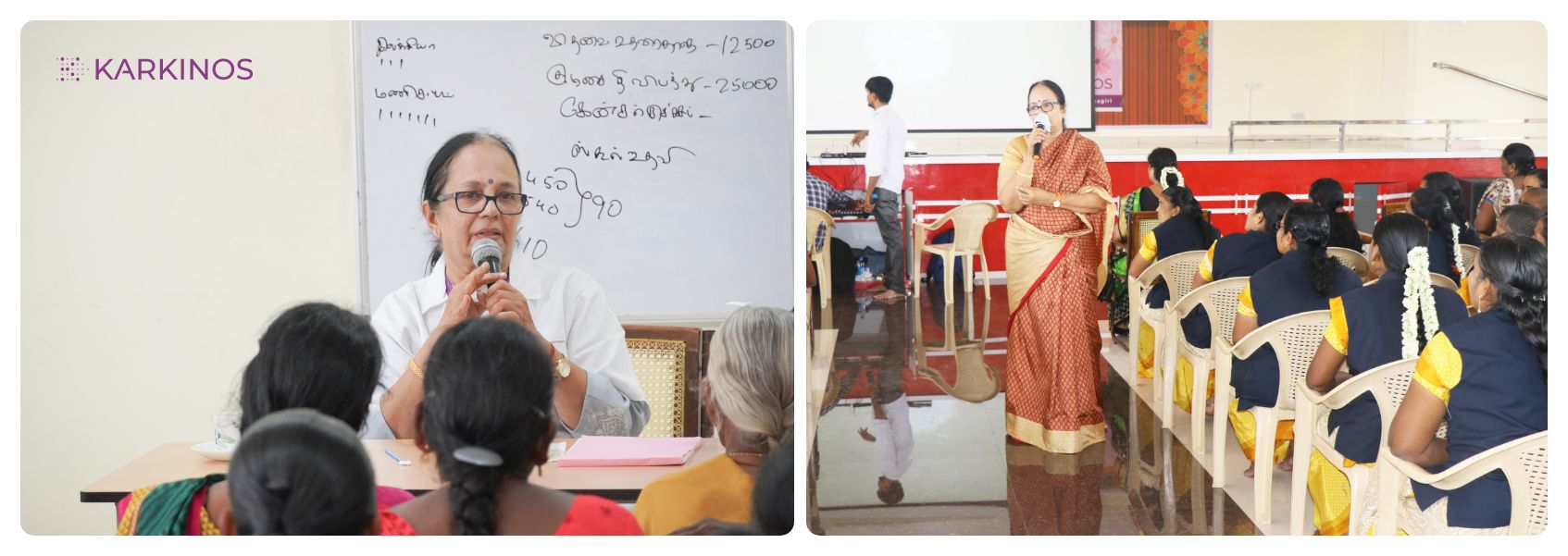
Apart, the awareness session is delivered in local language using analogies that are easily understood by women (like removal of weed from good yielding crops and plants). Hence, a small talk explaining what to look out for as cancer symptoms is explained in detail. Especially for married women and menstruating women, and most importantly tobacco consuming women are explained why it is important to self-examine their body (breasts) or report to the nearest doctor when they find something unusual in their bodies or in their monthly menstrual cycle. Aside, the value of consuming hygienic food and food that are nutritious is stressed.
Women are also reassured that the tests done at the screening programme will cause them no harm. Equipment used for sample collection is shown to the women beforehand to prepare their mind and assure them that the tests are done for their own good. The cost factor is also explained to them, and they are given a comparative costing of early detection tests versus advanced cancer detection tests.
One of the best outcomes of this awareness session is that the women who understand the benefits of the early cancer detection tests take home the message to their family members, friends, and neighbours. The trust in this programme helps them to become a catalyst for the spread of the advantage of the programme through word of mouth. These women take home the message on cancer prevention and while doing so not only her own family members are made aware, but her extended family also becomes aware of the cancer signs and symptoms and cancer detection tests.
Thus, when women present themselves for the screening tests, they appear calm, relaxed and receptive, showing higher compliance to the sample collection for HPV testing, and are fully convinced that the tests are done for their own wellness and if at all cancer is detected, it can be successfully fought at an early stage causing less burden.
KHID generation and ABHA generation by KH staff
The KH team comprises two KareMitras for KHID registration and ABHA registration, three nursing interns for vitals and navigation, three staff members from KH for cancer risk assessment (CRA), two KH nurses for sample collection, two doctors for screening, and three interns for data uploading.
The KHID is Karkinos Healthcare Health ID, which is generated for every citizen encountered at the screening programme. While the KHID is generated simultaneously, an ABHA) is also generated. These digital IDs are essential to store Electronic Health Records of an Indian citizen.

Registration and ABHA generation of IVDP participants by KareMitras
KHID-linked health records are maintained in the Kare360 WebApp. All details of the citizens are stored in this App for their effective navigation through their cancer care journey. The Command Centre of Karkinos Healthcare, which is responsible for follow-up and navigation of the citizen, uses the KHID to track the citizen’s next course of progress in care, ensuring that there is no drop out of the citizen at any point. This way an end-to-end care is effectively managed by both manual and digital tracking systems. Moderate Risk and High-Risk citizens are flagged to enable Physicians and Oncologists of Karkinos Healthcare to maintain a continuous monitoring system.
The major advantage of an ABHA account/number generated for a citizen is the access to one’s healthcare records anywhere and anytime. India’s Ayushman Bharat Digital Health Mission (ABDM) is a flagship programme aimed at improving access to healthcare services and promoting digital health, on a large scale, in the country. The program is focused on the development of a national digital health infrastructure that enables the creation, storage, and exchange of Electronic Health Records (EHRs) for all its citizens in a secure and consented way.
It has to be noted here that considering the digital literacy of the population in Krishnagiri, the health records are present in both forms, i.e., paperless (digital) as well as physically printed health records.
Checking for vitals
Once both the IDs are generated, the citizen is then asked to move to the next stage for checking their major vitals. The interning nurses check for each citizen’s medical history. Values of each citizen’s Body Mass Index (BMI), Blood Pressure, Heart Rate and Pulse, Respiratory Rate, Body Temperature, are recorded both in the physical documentation as well as in the digital Kare360 WebApp.
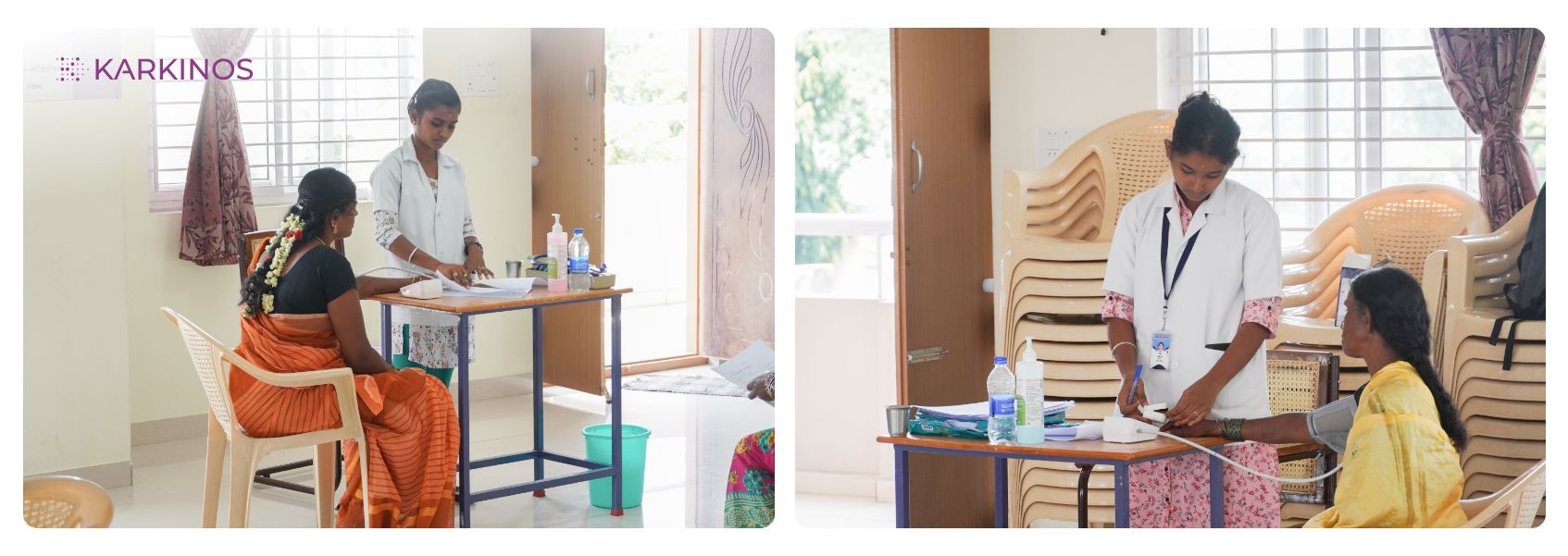
Checking and recording of weight, height, BMI, BP, etc. by KH nurses
Screening for Oral, Breast, and Cervical Cancers
After the vitals are checked and recorded, the citizen’s progress to the most important stage of cancer screening. Regular oral visual examinations, clinical breast examinations, and cervical cancer screenings help healthcare providers identify potential issues at an early stage when intervention and treatment are most effective.
A team of Karkinos’ most efficient and experienced physicians and nurses perform:
- Oral Visual Examination (OVE)
- Clinical Breast Examination (CBE)
- Cervical Cancer – HPV DNA Test (HPV) using COBAS 6800 automated platform.
The physicians and nurses follow Karkinos Healthcare Clinical Pathways that are carefully curated and standardised by Karkinos’ eminent panel of globally acclaimed oncologists. These pathways include protocols for examining common cancers, and all healthcare professionals are well-versed in the details and nuances of these protocols.
ORAL VISUAL EXAMINATION (OVE)
In India, we know that the rural population (both men and women) are habituated to the consumption of tobacco (predominantly the chewable tobacco type). Their addiction to this form of tobacco leads to problems such as oral cancer.
Hence, the purpose of an oral visual examination is to detect oral cancer at an early stage when it is most treatable. Regular screenings are especially important for individuals who have risk factors for oral cancer, such as tobacco and alcohol use.
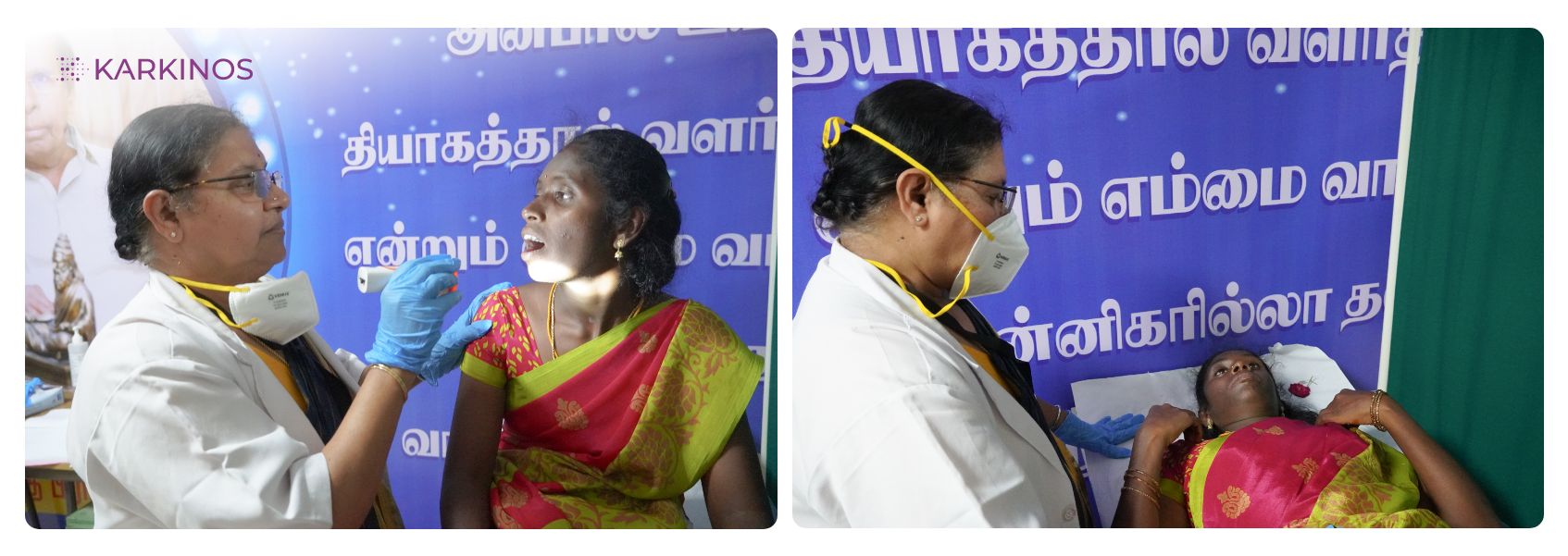
Dr. Ambujam Narayana performing oral examination on IVDP member, Sathya (who consented for her picture to be captured and used appropriately by team KH)
The oral visual examination is a medical assessment of the oral cavity. It is done to check for signs of any precancerous lesions and cancers of the oral cavity and other oral health issues. During the examination, the healthcare provider will visually inspect the inside of the mouth, including the lips, gums, tongue, palate, throat, and the back of the mouth. The screening doctors look for any abnormalities, such as lesions, ulcers, lumps, white or red patches, or other unusual changes in the oral cavity.
In the instance of a woman presenting any of the above symptoms, risk stratification is done and then the next steps in cancer care is advised. In the case of IVDP members, the respective leaders are informed about the citizen’s risk to the development of oral cancer and then the woman is referred for further diagnosis and treatment at St. John’s Hospital in Bangalore.
CLINICAL BREAST EXAMINATION (CBE)
A Clinical Breast Examination (CBE) is a physical examination of the breasts that is conducted by the doctors at the screening programme. All women >30 years of age are recommended to undergo this screening test. During a CBE, the doctor uses her hands to feel and examine the breasts, including the nipples and underarm areas. They check for any lumps, changes in breast size or shape, skin dimpling, nipple discharge, or any other abnormalities that possibly indicate a problem. While they are less sensitive than mammograms (breast X-rays), CBEs can be a valuable primary detection tool, especially for women who may not be aware of the symptoms to look out for.
*It may be noted that this way of self-examination of the breasts is taught to the women in the counselling session in the beginning. In case a woman notices any such change, she is advised to promptly visit the nearest health centre or health professional.
Women with a known family history of breast cancer or other risk factors are advised to start Clinical Breast Examinations earlier or undergo more frequent screening. These recommendations are made on an individualised basis.
Just like OVE, in case of Karkinos’ doctors identifying a symptom or sign of breast cancer, the IVDP is made aware, and the organisation ensures that an effective guidance is offered for further diagnosis and confirmation/staging of breast cancer at St. John’s Hospital, Bangalore.
CERVICAL CANCER – HPV DNA TEST
An HPV test is a screening test for cervical cancer. It checks for the presence of high-risk strains of the Human Papillomavirus (HPV) in a woman’s cervical cells.
During an HPV test, the doctor collects a sample of cervical cells (similar to a Pap smear) and sends it to state-of-art Karkinos’ HPV Testing Laboratory (located in Kochi) for testing. The test looks for the genetic material of high-risk HPV strains. HPV testing is the most accurate, reproducible, and sensitive test to early detect cervical cancer and its precursors.
HPV is the common cause of cervical cancer. Detecting high-risk HPV strains through this test can identify women at an increased risk of developing cervical cancer.
The World Health Organization recommends HPV testing as the most preferred test over other screening tests. HPV testing is recommended for all apparently healthy women above the age of 25 or 30 years and may be repeated once in 5 years or 10 years if the baseline test is negative for infection.
A major advantage of HPV testing is that if the woman is negative on testing, she is unlikely to develop cervical cancer in the following 5-10 years and her lifetime risk of developing cervical cancer is extremely low. The results of currently available HPV tests indicate if a woman is positive or negative for infection with one or more of the 14 high risk HPV type(s), and if positive, the HPV type(s) in the sample. Those positive for HPV 16 or HPV 18 infection are more likely to harbour a precancerous change compared to other 12 types. Of all cervical screening tests HPV testing is the most effective to detect cervical precancerous changes.
If HPV is detected, further testing, such as a colposcopy, is recommended to assess the cervical cells for abnormalities and treated with Thermal ablation or loop electrosurgical excision procedure (LEEP) as the case may be. Again, IVDP takes the responsibility to navigate the patient, in case of being positive, to St. John’s Hospital for further diagnosis and treatment.
Final verification and post counselling
Once a woman completes her screening for OVE, CBE, and HPV, she is finally directed to the Chief Nurse who cross checks all the details of the individual. Her name and KHID are cross-checked. Prescriptions, if any, recommended by the physician, are explained in the local language to the woman to reassure that her condition can be managed with proper medical intervention. Each of her details are verified to ensure that there are no negative consequences of oversight.
What needs a special mention here is that the staff treat the citizens with courtesy and absolute empathy and have a uniform patient attitude towards addressing every query posed by the citizens.
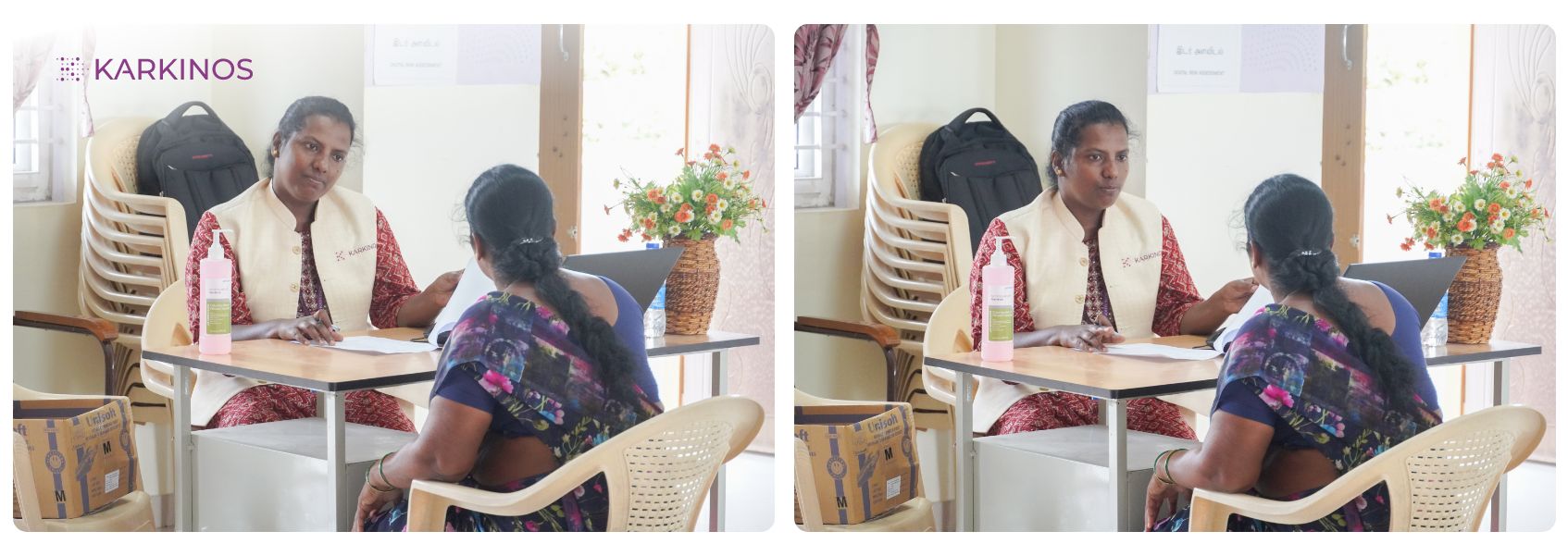
Senior Nurse of Karkinos Healthcare cross checking reports and empathetically addressing concerns related to cancer screening
Also, both organisations – IVDP as well as Karkinos Healthcare have a robust digital-backed system that ensures no citizen is dropped out of the care pathway.
In conclusion, it can be said that every woman who partakes in this screening programme returns home with a thought that she has taken her first essential step towards cancer prevention and is also taking home the message that cancer can be managed when detected at early stages. Therefore, with the optimum use of technology, we at Karkinos Healthcare and IVDP are confident that such targeted community cancer screening programmes will bring about a marked decrease in the cancer incidence and burden observed in India.
